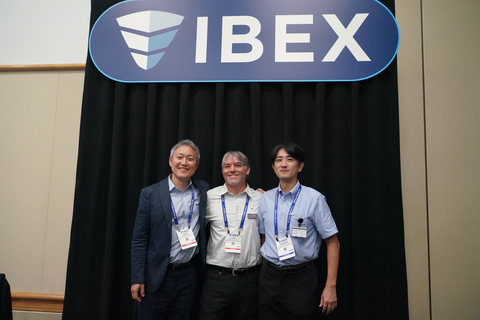
Yamaha Illuminates Hydrogen for Recreational Craft During 2024 IBEX®
Published by Todd Bush on October 18, 2024
KENNESAW, Ga.--(BUSINESS WIRE)--"Our work with hydrogen technology is a key part of Yamaha’s commitment to sustainability and innovation,” said Grant Suzuki, Yamaha U.S. Marine Business Unit Chief of Technology.
"By collaborating with industry leaders and advancing hydrogen propulsion systems, we’re not only exploring new possibilities for carbon-neutral marine products but also ensuring the performance and reliability Yamaha is known for remain uncompromised."

Grant Suzuki, Chief of Technology, Yamaha U.S. Marine Business Unit, Louis Doucette, Manager, Advanced Vehicles, Yamaha U.S. Marine Business Unit, and Tomoyoshi Onikata, Automotive Development Section, Yamaha Motor Company, dissected the challenges and opportunities related to hydrogen fuel storage, distribution infrastructure and regulatory requirements during IBEX 2024. (Photo: Business Wire)
>> In Other News: Vision RNG Secures $207 Million in Financing From Hasi to Construct Two LFG to RNG Projects in Ohio
Suzuki’s comments underscored “Hydrogen for Recreational Craft,” which Yamaha presented during the recent 2024 International BoatBuilders’ Exhibition (IBEX®).
The presentation included insights into Yamaha’s collaboration with leading industry partners, such as Roush and Regulator Marine, the long history of Yamaha’s efforts in hydrogen development, and the technical aspects of engineering a hydrogen internal combustion engine.
Along with Suzuki, Louis Doucette, Manager, Advanced Vehicles, and Tomoyoshi Onikata, Automotive Development Section, Yamaha Motor Company, dissected the challenges and opportunities related to hydrogen fuel storage, distribution infrastructure, and regulatory requirements.
The Yamaha team shared news of the company’s ongoing testing and development efforts. In early 2024, Yamaha introduced a hydrogen-powered golf car and a hydrogen-powered outboard (both industry firsts) as means to explore hydrogen as a possible method of achieving carbon neutrality within its product lines.
Yamaha has a long-standing commitment to exploring innovative and sustainable technologies, including hydrogen as a potential fuel source. The company's interest in hydrogen technology dates back to 2003 with early research into alternative energy solutions aimed at reducing environmental impact.
Over the years, Yamaha collaborated with various partners to develop hydrogen-powered engines. These efforts align with Yamaha's broader strategy to reduce carbon emissions and contribute to a more sustainable future.
By exploring hydrogen as a clean and renewable energy source, Yamaha is advancing environmental goals while maintaining performance and reliability.
Pursuit of hydrogen technology is just one example of Yamaha’s suite of multiple technology solutions to reduce carbon. Earlier this year, Yamaha acquired electric marine propulsion leader Torqeedo, expanding Yamaha's capabilities in electric and hybrid power.
In addition, Yamaha is actively researching and promoting the use of sustainable marine fuels as part of ongoing efforts toward carbon neutrality across the industry.
Yamaha U.S. Marine Business Unit, based in Kennesaw, Ga., markets and sells marine outboard motors ranging in size from 2.5 to 450 horsepower. It also engineers, manufactures, markets, and sells boat control systems, IoT control devices, fiberglass, jet-drive sport boats ranging from 19 to 27 feet, and personal watercraft.
The unit includes the manufacturing divisions of Yamaha Marine Systems Co., Inc., including Kracor of Milwaukee (rotational molding), Bennett Marine of Deerfield Beach, Fla. (trim tabs), and Yamaha Marine Precision Propellers of Indianapolis (stainless steel propellers). Yamaha U.S. Marine Business Unit is a division of Yamaha Motor Corporation, U.S.A., based in Cypress, Calif.
This document contains many of Yamaha's valuable trademarks. It may also contain trademarks belonging to other companies. Any references to other companies or their products are for identification purposes only and are not intended to be an endorsement.
REMEMBER to always observe all applicable boating laws. Never drink and drive. Dress properly with a USCG-approved personal floatation device and protective gear.
Subscribe to the newsletter
Daily decarbonization data and news delivered to your inbox
Follow the money flow of climate, technology, and energy investments to uncover new opportunities and jobs.
Latest issues
-
96% Pure H₂ Found Underground — Now What?
Inside This Issue 🧪 HyTerra's Kansas H₂ Could Power a Historic Industry First 🤝 Prime Minister Carney Secures Ambitious New Partnership With India Focused on Energy, Talent, and Technology Françai...
-
What Do Submarines Have to Do With Hydrogen?
Inside This Issue 🚢 Hyundai Pitches Hydrogen Transport Tied To Canada Submarine Bid 🧱 The LEGO Group Expands Its Portfolio Of Carbon Removal Solutions 🏆 SAF Pioneer LanzaJet Honored With RFA Indus...
-
This $4.1M Deal Could Change Carbon Capture's Playbook
Inside This Issue 🗜️ CarbonQuest Lands $4.1M Alberta Deal on Gas Compressors 🛡️ CADO, 123Carbon, and Assure SAF Registry Join Forces to Tackle SAF Integrity Gaps ✈️ ISCC, OMV, and Airbus Partner t...
Company Announcements
-
Plug Power Welcomes Jose Luis Crespo as Chief Executive Officer
Crespo’s commercial and operational expertise positions Plug for disciplined growth and execution SLINGERLANDS, N.Y., March 03, 2026 (GLOBE NEWSWIRE) -- Plug Power Inc. (NASDAQ: PLUG), a global le...
-
Company expands global footprint through signed feedstock MOUs intended to support the future development of up to 1,000,000 tons of annual SAF production by 2035 HOUSTON, March 3, 2026 /PRNewswir...
-
Leading Institutional Investor Backs Over 650 MW Wind Portfolio, Integrated Green Fuels Developments, and Multi-GW Renewables Pipeline EverWind today announced a US$175 million (CAD$240 million) s...
-
Murkowski And Colleagues Introduce Bipartisan Bill To Advance Marine Carbon Dioxide Removal
Washington, D.C. – Today, U.S. Senators Lisa Murkowski, (R-AK) and Brian Schatz, (D-HI), with Representatives Suzanne Bonamici, (D-OR) and Earl L. “Buddy” Carter, (R-GA) introduced bipartisan, bica...